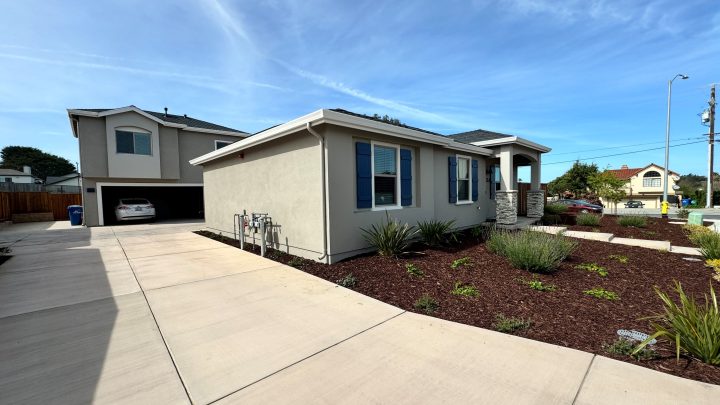
Cash for your backyard? Companies, homeowners try to capitalize on a California law.
Cash for your backyard? Companies, homeowners try to capitalize on a California law.

Since 2018, a number of U.S. cities and states have changed their laws to allow more housing in most single-family neighborhoods. Among them are Minneapolis; Austin, Texas; and Oregon and Washington states. All now allow two or more homes on lots that used to just house one.
In California, a similar law, SB 9, was hailed as a way to spur housing construction in a state that has a dire shortage of it — but it was also decried as a threat to the character of suburban neighborhoods.
In the roughly two years since the law’s been in effect, it hasn’t really done either of those things. But that may soon change. For homeowners with space to spare, a few new companies have emerged with an offer: cash for your backyard.
Gail Tremaine walked up a short, steep slope, stopping where the hill plateaued.
“It’s a big space,” she said, turning around to face the house and a sweeping vista. “Look at your view. Isn’t that gorgeous?”
The Silicon Valley city of San Jose spread out in front of her, with its downtown skyline in the distance. “You see the whole valley,” she said. “And in the fall, when the leaves change, it’s just beautiful.”
She and her husband are planning to give up this view, though. Both are in their 70s and mostly retired — Gail Tremaine from working in real estate and Brian Tremaine from the tech industry.
“We’re getting to the age where we want less land,” Brian said. “So right now, it’s just become an area we need to do the weed control, and the county gets after us if the weeds get too high.”
So, they decided to sell this portion of their backyard. They’re able to do that thanks to a California law that went into effect in 2022. It allows for the lot split and for developers to build two homes on each new lot.
But, despite a major housing shortage across the state, the law hasn’t produced much in the way of new supply.
“These types of projects are really costly and complicated for a homeowner to take on,” said Ben Bear, CEO of BuildCasa, the company that bought the Tremaines’ lot. “They’re basically asking the homeowner to be a developer.”
Bear wants to make it easier for homeowners to benefit from the law without having to do all the work themselves. “Homeowners can get anywhere from $50 to $400,000 in cash while keeping their existing home and mortgage,” he said.
Bear said his clients make, on average, just over $100,000.
In exchange, they get a closer neighbor and smaller backyard, and potentially lose up to 10% of their existing property’s value. That’s according to Bear and another company that does these deals.
“So there’s a major sort of positive benefit when you compare those two numbers,” he said.
A growing number of companies are specializing in particular aspects of the new law or offering similar services.
Typical clients tend to fall into two camps: retirees looking to downsize — like the Tremaines in San Jose — and younger homeowners hoping to upsize, like Jamele Mason. The 34-year-old is a former track athlete who made his career in real estate. He bought his home in Los Angeles a little more than four years ago.
Mason was looking for ways to pull equity out of his house without taking on more debt.
“I put everything I had into purchasing this house,” he said. “So, when I found out that I could pull the money out, I was like, “Wow, that’s actually a really cool way to leverage what I have.”
He said he’ll receive a six-figure payment for his backyard from a company called Yardsworth, where he’s since taken a job as a sales manager. He plans to use that money to buy an investment property in Texas.
“I’m forward-thinking,” he said. “What’s the best way for me to set myself up so that I can retire or just be somewhat comfortable in the later half of my life?”
As for the duplex that will rise behind his small, two-bedroom home? He said he’s bracing for it. Along with the construction zone that’ll come with.
“That is also a sacrifice,” he said. “But, you know, a short-term sacrifice for a long-time gain is not a bad idea to me.”
That’s what these companies are banking on: that they can entice more homeowners to sell their backyards. And hopefully make a dent in California’s housing crisis.
There’s a lot happening in the world. Through it all, Marketplace is here for you.
You rely on Marketplace to break down the world’s events and tell you how it affects you in a fact-based, approachable way. We rely on your financial support to keep making that possible.
Your donation today powers the independent journalism that you rely on. For just $5/month, you can help sustain Marketplace so we can keep reporting on the things that matter to you.

















